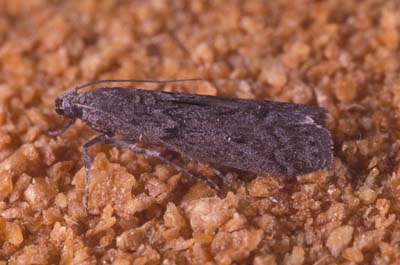
Adult Mediterranean flour moth, Anagasta kuehniella.
(Photographer: L.J. Buss, University of Florida)
The Mediterranean flour moth infests flour, cereals, bran, biscuits, dog food, nuts, seeds, chocolate, dried fruits, etc. The extensive silk webbing of the larva contaminates more food than it eats and is also responsible for clogging mill machinery. It is one of the most important pantry pests in the home. It is worldwide in distribution.
The adult moth has pale gray forewings, transversely marked with two zigzag gray lines. The hind wings are dirty white. The wingspan is 24 mm or less. The adult female can lay several hundred eggs that hatch in three to five days. The larvae remain in the silken tubes they weave, eventually becoming about 15 mm in length. The entire life cycle takes about nine to 10 weeks. Under favorable conditions, there may be four to five generations per year.
Images
To save the Web-optimized images shown below to your hard drive:
|
Click to access Display and Print quality images. |
|
Click to access Display and Print quality images. |